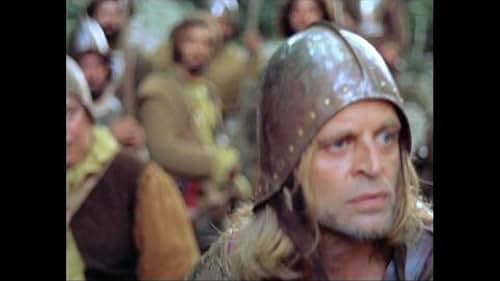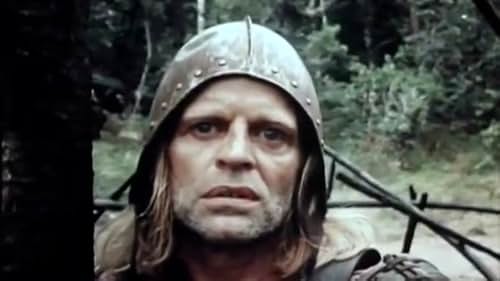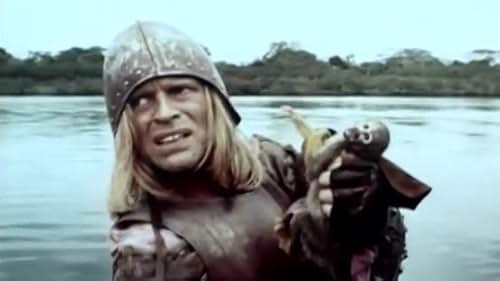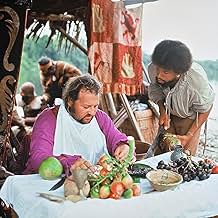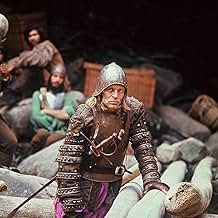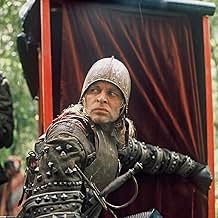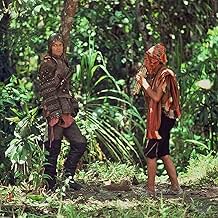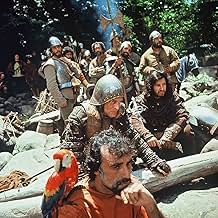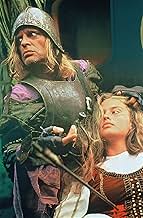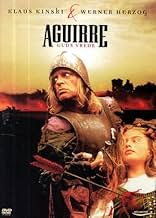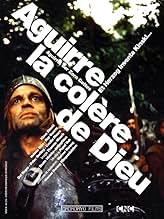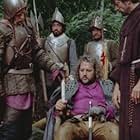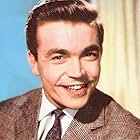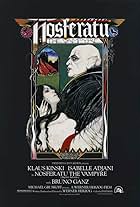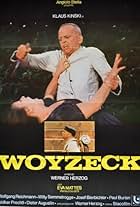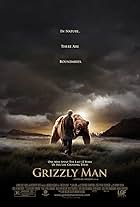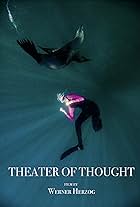VALUTAZIONE IMDb
7,8/10
63.808
LA TUA VALUTAZIONE
Nel XVI secolo, il folle e spietato Don Lope de Aguirre conduce una spedizione spagnola alla ricerca dell'El Dorado.Nel XVI secolo, il folle e spietato Don Lope de Aguirre conduce una spedizione spagnola alla ricerca dell'El Dorado.Nel XVI secolo, il folle e spietato Don Lope de Aguirre conduce una spedizione spagnola alla ricerca dell'El Dorado.
- Regia
- Sceneggiatura
- Star
- Premi
- 4 vittorie e 3 candidature
Claus Biederstaedt
- Brother Gaspar de Carvajal
- (voce)
- (non citato nei titoli originali)
Lothar Blumhagen
- Don Pedro de Ursua
- (voce)
- (non citato nei titoli originali)
Heinz Theo Branding
- Don Fernando de Guzman
- (voce)
- (non citato nei titoli originali)
Christian Brückner
- Balthasar
- (voce)
- (non citato nei titoli originali)
Trama
Lo sapevi?
- QuizDuring a particularly rowdy night of production, Klaus Kinski, irritated by the noise from a hut where cast and crew were playing cards, repeatedly fired with a Winchester rifle into it. One of the bullets took the tip of an unnamed extra's finger off. Werner Herzog immediately confiscated the weapon and it remains his property to this day.
- BlooperThe indigenous Peruvians wear clothes that were imported by Europeans in the 19th century.
- Citazioni
Don Lope de Aguirre: That man is a head taller than me. That may change.
- Versioni alternativeThe early 2000's DVD release is missing the opening shot (after the text scroll) of the clouds parting to reveal the mountains. It simply opens on the shot following the line of people descending the narrow mountain trail. It also is missing the title credits over the river water. Earlier U.S. video versions were missing these titles as well, but kept the footage so that the film had several seemingly unmotivated long shots of the flowing water.
- ConnessioniEdited into Spisok korabley (2008)
- Colonne sonoreAguirre, Der Zorn Gottes (Lacrime Di Re)
Written by Florian Fricke
Performed by Popol Vuh
Published by Edition Intro Meisel
Courtesy of Gammarock Music
Recensione in evidenza
If a guy standing on a raft, as the camera spins round and round it in 180 degree fashion, clutching a monkey looking as dazed and confused as we might well be whilst talking about ideas of world domination and how they'll take on nations single-handedly sounds like the sort of film you'd like, then you'll love Aguirre, der Zorn Gottes. But don't let the sheer avant-garde nature of that scene fool you into thinking it's something that sounds quite silly because the film is anything but. Aguirre, the Wrath of God is a bizarre and yet strangely compelling piece that teeters on the brink of fiction film-making and documentary but for sure, charges through the barrier labelled 'art'.
So where to start with a film as bizarre as Aguirre? The film is like a docu-drama; a biopic of absolutely nobody in particular and yet you feel it centre around something anyway what could it be: a man going insane? A heritage film about the Spanish conquistadors made by the Germans? An experiment of a film shot in the jungle merely to make it more gruelling for the cast and crew? Well, it's probably all of these things and much more. Aguirre, the Wrath of God sees Klaus Kinski's Don Lope de Aguirre lead, eventually, many Spanish soldiers through the jungles in search of El Dorado, the city of gold. Immediately, this establishes a sense of greed amongst the characters added only further by the establishment of their location. The jungle is thick and intense, with several shots dedicated to seeing the soldiers hack their way through it for cannons and royal boxes to proceed. The very first shot of the film sees steep South American hills cover the screen. The people are shown to be microscopic versions of themselves, making them look like ants crawling down a hill - a cannon is dropped accidentally but they must go on.
Such an immediate beginning and choice of shot, composition and subject matter is quite brilliant it puts us right there and tells us exactly what they're up against. We might think this is a man vs. nature tale, but the third element of the tribal natives are an important and somewhat enjoyable addition to the story. As a setting and as a set up, the film ticks plenty of boxes but as a character study Kinski's Aguirre is both bizarre and yet fascinating all the same. Aguirre is given a bizarre sort of face thanks to the casting of Kinski, also his actions and general body language right from the off implant a certain degree of un-canniness or eccentricity about him.
So for a film to establish both setting and characterisation of the lead role in such a manner is impressive; nobody else is really developed or has as much attention paid to them because, simply put, they are not as important. The film's narrative may feel as if it is lacking in this disorientating and surreal film and yet if anything adds to the brilliance of the film. More contemporary examples of this could perhaps be seen in other such off-the-wall films that revolve around an (in)sane protagonist such as Taxi Driver and American Psycho but Aguirre, the Wrath of God is more-so a rural version of those sorts of approaches. If one were to look more recently at a cause and effect passage of storytelling in a film demanding a man vs. nature perspective, one might find the final half an hour of Apocalypto as a good example.
The one scene that does stand out as a clear tactic to confuse and force the audience into thinking is the one in which, very early on (perhaps the initial incident?) the leader of the Spaniards is killed off through one way or another creating an ambiguous situation in which the group are already established to be struggling, Aguirre seems to be going a little crazy and now nobody can lead them to El Dorado. This is where, of course, Aguirre's character study kicks in. As a mission and as an idea for the narrative, searching for El Dorado is both brave and foolish of the team. Aguirre further looks insane when he uses the last resorts of the recent conquest of Mexico as a drive for success, something completely unrelated and something rather different to searching for something that could quite possibly not exist. Rather than an example of poor story telling emphasised by unrelated dialogue, it actually acts as a well timed line about something else uttered by someone perhaps going under.
And so from this setting of the scene, the character introduction and scenario Aguirre and the band of soldiers travel on a mere raft, down a river which you very much get the feeling is of no return. But that's part of that particular beauty, we never really know where it leads or how they'll get back. The film becomes a series of scenes that play on both nature, the third element of the natives complete with deadly arrows and trouble afoot on the raft itself. Each of the three make up a dramatic and artistic triangle that engrosses and entertains. Incidentally nearer the end, Aguirre seems more interested in conquering Port-of-Spain in Trinidad than finding a city of lost gold perhaps that is the one sane moment in the film Aguirre expresses: his realisation that such a thing could probably only exist in legend.
So where to start with a film as bizarre as Aguirre? The film is like a docu-drama; a biopic of absolutely nobody in particular and yet you feel it centre around something anyway what could it be: a man going insane? A heritage film about the Spanish conquistadors made by the Germans? An experiment of a film shot in the jungle merely to make it more gruelling for the cast and crew? Well, it's probably all of these things and much more. Aguirre, the Wrath of God sees Klaus Kinski's Don Lope de Aguirre lead, eventually, many Spanish soldiers through the jungles in search of El Dorado, the city of gold. Immediately, this establishes a sense of greed amongst the characters added only further by the establishment of their location. The jungle is thick and intense, with several shots dedicated to seeing the soldiers hack their way through it for cannons and royal boxes to proceed. The very first shot of the film sees steep South American hills cover the screen. The people are shown to be microscopic versions of themselves, making them look like ants crawling down a hill - a cannon is dropped accidentally but they must go on.
Such an immediate beginning and choice of shot, composition and subject matter is quite brilliant it puts us right there and tells us exactly what they're up against. We might think this is a man vs. nature tale, but the third element of the tribal natives are an important and somewhat enjoyable addition to the story. As a setting and as a set up, the film ticks plenty of boxes but as a character study Kinski's Aguirre is both bizarre and yet fascinating all the same. Aguirre is given a bizarre sort of face thanks to the casting of Kinski, also his actions and general body language right from the off implant a certain degree of un-canniness or eccentricity about him.
So for a film to establish both setting and characterisation of the lead role in such a manner is impressive; nobody else is really developed or has as much attention paid to them because, simply put, they are not as important. The film's narrative may feel as if it is lacking in this disorientating and surreal film and yet if anything adds to the brilliance of the film. More contemporary examples of this could perhaps be seen in other such off-the-wall films that revolve around an (in)sane protagonist such as Taxi Driver and American Psycho but Aguirre, the Wrath of God is more-so a rural version of those sorts of approaches. If one were to look more recently at a cause and effect passage of storytelling in a film demanding a man vs. nature perspective, one might find the final half an hour of Apocalypto as a good example.
The one scene that does stand out as a clear tactic to confuse and force the audience into thinking is the one in which, very early on (perhaps the initial incident?) the leader of the Spaniards is killed off through one way or another creating an ambiguous situation in which the group are already established to be struggling, Aguirre seems to be going a little crazy and now nobody can lead them to El Dorado. This is where, of course, Aguirre's character study kicks in. As a mission and as an idea for the narrative, searching for El Dorado is both brave and foolish of the team. Aguirre further looks insane when he uses the last resorts of the recent conquest of Mexico as a drive for success, something completely unrelated and something rather different to searching for something that could quite possibly not exist. Rather than an example of poor story telling emphasised by unrelated dialogue, it actually acts as a well timed line about something else uttered by someone perhaps going under.
And so from this setting of the scene, the character introduction and scenario Aguirre and the band of soldiers travel on a mere raft, down a river which you very much get the feeling is of no return. But that's part of that particular beauty, we never really know where it leads or how they'll get back. The film becomes a series of scenes that play on both nature, the third element of the natives complete with deadly arrows and trouble afoot on the raft itself. Each of the three make up a dramatic and artistic triangle that engrosses and entertains. Incidentally nearer the end, Aguirre seems more interested in conquering Port-of-Spain in Trinidad than finding a city of lost gold perhaps that is the one sane moment in the film Aguirre expresses: his realisation that such a thing could probably only exist in legend.
- johnnyboyz
- 24 lug 2008
- Permalink
I più visti
Accedi per valutare e creare un elenco di titoli salvati per ottenere consigli personalizzati
Dettagli
- Data di uscita
- Paesi di origine
- Lingue
- Celebre anche come
- Aguirre, the Wrath of God
- Luoghi delle riprese
- Huayna Picchu, Peru(mountain with stone stairway in the opening scene)
- Aziende produttrici
- Vedi altri crediti dell’azienda su IMDbPro
Botteghino
- Budget
- 370.000 USD (previsto)
- Lordo in tutto il mondo
- 37.732 USD
Contribuisci a questa pagina
Suggerisci una modifica o aggiungi i contenuti mancanti


